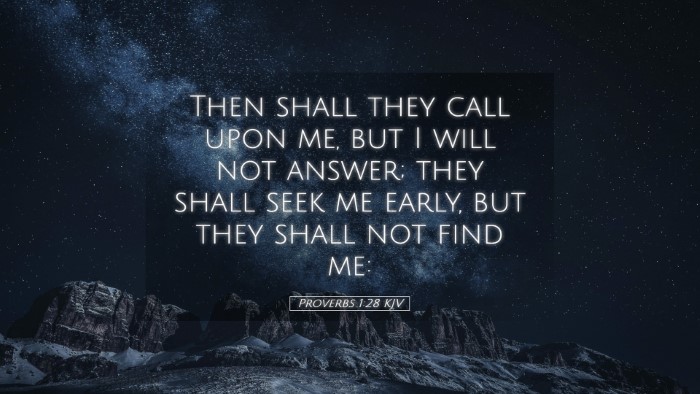Commentary on Proverbs 1:28
Proverbs 1:28 states, "Then shall they call upon me, but I will not answer; they shall seek me early, but they shall not find me." This verse serves as a sober warning about the consequences of disregarding wisdom and the call of God. It reflects a crucial moment in which individuals, having neglected divine wisdom, find themselves in desperation yet receive no response. This commentary explores various insights from renowned biblical scholars to deepen understanding of this verse.
Contextual Analysis
Context is critical in understanding Proverbs 1:28. This proverb is part of the first chapter of the book of Proverbs, which introduces the theme of wisdom and folly. It underscores the importance of heeding wisdom's call. As Matthew Henry mentions, this verse marks a transition from instruction to warning, highlighting the inevitable consequences of refusing wisdom.
The Nature of Wisdom's Call
The plea of wisdom is consistent throughout Scripture. Wisdom personified beckons the ignorant and foolish (Proverbs 1:20-23), offering counsel that leads to life. When individuals spurn this invitation, they prepare themselves for calamity. Henry notes, "Wisdom cries in the streets, but those who do not listen will find themselves forsaken in times of trouble."
Divine Silence as Judgment
In Proverbs 1:28, the phrase "I will not answer" serves as a profound and troubling assertion. Albert Barnes elucidates this by suggesting that God’s refusal to respond is a form of judgment. He elaborates that when individuals have continually rejected divine counsel, their cries in distress will go unanswered, emphasizing the lesson that persisting in folly leads to judgment and isolation.
Seeking God Early
The latter part of the verse, "they shall seek me early, but they shall not find me," speaks to the urgency with which many come to seek wisdom in times of crisis. Adam Clarke highlights that this seeking often arises out of desperation, yet it is too late for those who ignored wisdom during tranquil times. The reference to seeking 'early' signals an attitude of diligence that is only effective when it is timely. This is not merely about early hours of the day but rather the timeliness of turning to God in one's life.
Consequences of Rejecting Wisdom
Rejecting wisdom ultimately invites turmoil. This theme resonates throughout Proverbs. The passage points to the stark reality that choices have consequences; those who disregard wisdom will find themselves without guidance when they need it most. Henry emphasizes that God’s silence is not arbitrary but a natural response to humanity’s persistent obstinacy.
Reflection for Theological Insight
For pastors and theologians, Proverbs 1:28 serves as a powerful reminder of the necessity of fostering a relationship with God through wisdom. The dangers of neglecting God’s voice are paramount. As Clarke concludes, "Let not any soul presume upon the mercy of God without the cooperation of a wise and diligent heart." Engaging with Proverbs in its entirety fosters a more profound understanding of God’s nature and the importance of responsiveness to His call.
Final Thoughts
In conclusion, Proverbs 1:28 stands as a warning about the spiritual dangers of neglect and disobedience. This commentary provides a meaningful exploration for scholars, pastors, and learners in the faith. The consequences of ignoring the call of wisdom are dire, and this verse encapsulates the urgency of seeking God before calamity strikes. We are urged to listen carefully to God’s wisdom, for in Him lies the path to true understanding and life.


